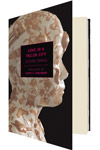Love in a Fallen City will continue to introduce Eileen Chang to the West, but she is, to mainland and Taiwanese readers, a much picked-over literary giantess: a Sylvia Plath analogue with her own culture industry, who had reporters flying to L.A. to dig through her trash. Yet a Guardian obit of October 1995 begins: “When the caretaker of a Los Angeles apartment block realised he had not seen the old Chinese lady for many days, he rang her bell and, on getting no answer.…” Chang was found dead on September 8, 1995, after forty years with little output and increasing hermitism. Her loneliness, sometimes improved to “mystery” or “glamour”—a constant even in her out-and-about years as a young columnist in Shanghai—made her famous. It kept pace with her reputation when the work stopped.
In her teens, Chang was locked up by her opium-addict father for half a year before she was able to escape; at age seventy-three, she sent a photo of herself holding a newspaper with the date instead of accepting a major literary award in person. Even as a free woman she had a hostage mind-set. Her fictional creations have too much, or more often not enough, subjectivity. They suffer but don’t walk out to meet any kind of end. All of them are slightly unreal. This might be what director Ang Lee, whose string of films about societal outliers includes Brokeback Mountain and The Hulk, meant. Discussing actress hopefuls for his adaptation of the Chang spy thriller “Lust, Caution,” he said, “Basically, such a female character does not exist. We can only try to be as close to what she described. For example, if there are five requirements and no one meets all of them, we will look for four, three, two.”
Like Lee’s search (he cast an unknown, opposite Cantonese star Tony Leung), “Love in a Fallen City,” the title story, begins nearly doomed: a divorcée boards a boat to Hong Kong in pursuit of a playboy. Sometimes called the Gone with the Wind of the East, it’s more moony than imaginative—there’s a barefoot Indian temptress, middle-of-the-night phone calls from the hotel room next door, rain showers—and the ending could be shaken out of a box. Standing by a gray wall days before the Japanese bombing, the bachelor Liuyuan tells Liusu, who will become his mistress and then his wife:...
You have reached your article limit
Sign up for a digital subscription and continue reading all new issues, plus our entire archives, for just $1.50/month.
Already a subscriber? Sign in





